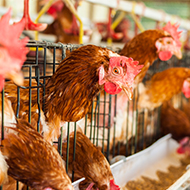RVC discovers high antibiotic use in Indian chicken farming
Antibiotics were used as a risk mitigation strategy in the early stages of production.
New research from the Royal Veterinary College (RVC) has revealed the extent that critically important human antibiotics are used in Indian chicken farming.
In collaboration with the West Bengal University of Animal & Fishery Sciences, the RVC found that poultry companies were having a more significant role in antibiotic use than chicken farmers.
The project saw a team of researchers interview 43 poultry stakeholders in Kolkata and the surrounding area of West Bengal in India between March 2021 and March 2022. This included farmers, poultry veterinary professionals, government veterinary teams, poultry company employees and poultry dealers.
The data was then examined using an economic framework called ‘agency theory’ to help examine the antibiotic use decisions.
The researchers found that most poultry farming occurred through contract farming arrangements. This was consistent with the wider image of India, where 80 per cent of poultry farming is performed under these conditions.
These chickens are frequently kept in housing which is open to the environment, meaning they are exposed to high temperatures, humidity and exposure to infectious diseases. This leads to antibiotics being used as a risk mitigation strategy to protect the birds during production.
The data also revealed that many stakeholders were concerned about the risk that the bacteria Mycoplasma poses to chicks. These concerns prompted stakeholders to use antibiotics routinely at the start of production.
The antibiotics used often belong to the classes which are considered critically important to human health – fluoroquinolone and macrolide antibiotics. RVC says that these antibiotics should never be routinely used for livestock production.
Many poultry companies have said that, though they do use antibiotic alternatives, they are expensive and not sufficient for protecting birds.
Mat Hennessy, the post-doctoral researcher from RVC who led the team, said: “Given the dominance of contract farming in chicken production in India, corporations are well positioned to coordinate a strategy towards lowering antibiotic use.
“However, these strategies should consider the wider infrastructural, institutional, and political environment within which chicken production occurs to promote antibiotic use in socially responsible ways.”
The full study can be found in the journal Plos One.
Image © RVC



 An Avian Influenza Prevention Zone (AIPZ) has been introduced across Wales.
An Avian Influenza Prevention Zone (AIPZ) has been introduced across Wales.